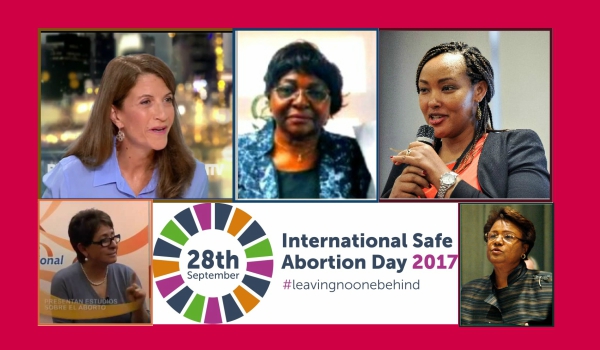SUSANA CHAVEZ, CONSORCIO LATINOAMERICANO CONTRA EL ABORTO INSEGURO (CLACAI)


#Poder elegir
Como cada año este día emblemático, El Consorcio Latinoamericano contra el Aborto Inseguro – CLACAI y todas las organizaciones y personas que la integran realizan un llamado para la despenalización y la ampliación del acceso al aborto legal y seguro en la región, como derecho humano de todas las mujeres.
El derecho al aborto legal y seguro es parte del derecho de las mujeres a la autodeterminación sobre sus propios cuerpos: a su derecho a decidir. Sin embargo, este derecho todavía no está garantizado en la región, ocasionando un elevado número de abortos en condiciones clandestinas e inseguras que, en muchas ocasiones, ocasionan muertes maternas totalmente innecesarias y evitables.
El aborto sigue totalmente prohibido sin excepciones en cinco países latinoamericanos: El Salvador, Nicaragua, Honduras, República Dominicana y Haití. Se permite solamente para salvar la vida de mujer en Guatemala, Paraguay y Venezuela; y en el resto de países, es posible acceder al aborto de acuerdo a ciertas causales, si bien continúa estando criminalizado. El acceso sin restricciones solamente se contempla en Cuba, Ciudad de México y Uruguay.
De acuerdo a este panorama, las mujeres siguen enfrentando diversas barreras para acceder a los servicios de aborto sin riesgos, aun en aquellas circunstancias en las que el aborto es legal. Entre tales barreras, se encuentran: la falta de acceso a la información, la imposibilidad de pagarlo, la falta de apoyo social, los retrasos en la prestación de atención médica, las actitudes negativas de los profesionales de la salud, la calidad deficiente de los servicios, la ausencia de acceso a servicios asequibles, la exigencia de la autorización de un tercero y restricciones sobre el tipo de proveedores de salud y de instalaciones que pueden proveer servicios legalmente, entre otras.
Es por todo ello que todas y todos los integrantes de CLACAI reivindicamos en este día la urgente necesidad de:
> Promover leyes en la región que mejoren el acceso de las niñas, adolescentes y mujeres a servicios de aborto seguro y a desafiar los intentos de restringir dicho acceso.
> Luchar y exigir la ampliación de las causales de aborto para reducir el número de procedimientos clandestinos y la criminalización de mujeres por aborto.
> Mejorar el acceso a servicios de aborto seguro para las mujeres, que cumplan con los criterios legales.
> Procurar la mejora y expansión de la provisión de atención postaborto para reducir los altos niveles de morbilidad y mortalidad que resultan del aborto inseguro.
#UnGritoGlobal por el #AbortoLegal
FULL STATEMENT: http://clacai.org/2017/09/28/28-septiembre-dia-accion-global-aborto-legal-seguro-gratuito/

